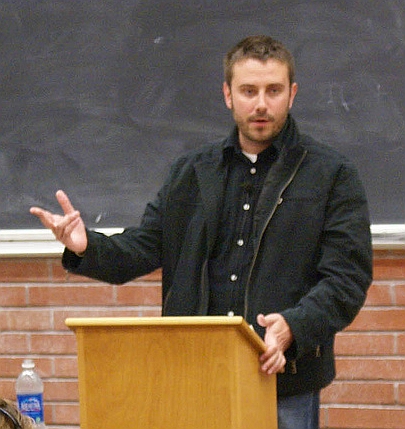“Get Your Fingernails Dirty”: a Master’s tea with investigative reporter Jeremy Scahill

BY ANNA MEIXLER
On Tuesday afternoon, journalist, author, and Yale’s newly-minted Donald Windham—Sandy M. Campbell Literature Prize Winner Jeremy Scahill addressed a crowd of students and adults affiliated with Yale and New Haven in the Ezra Stiles Master’s house. Master Stephen Pitti welcomed Scahill, the National Security Correspondent for The Nation and author of “Blackwater: The Rise of the World’s Most Powerful Mercenary Army” and “Dirty Wars: The World is a Battlefield” (which was produced also as a documentary film).
Scahill’s journalistic work has instigated Congressional inspection and great national discourse. He has reported from Afghanistan, Iraq, Somalia, Yemen, and the former Yugoslavia, focusing on covert American counterterrorism operations. Having exposed truths about controversial targeted killings and drone strikes, Scahill has won many journalistic honors. He humbly expressed appreciation for his recent Yale prize.
Scahill described a journalistic career beginning not with formal education and access to news agencies, but with an unconventional and impassioned interest in politics. Scahill’s perspective was shaped by the Catholic worker’s tradition of social responsibility in his native Milwaukee. A self-proclaimed “terrible student,” Scahill dropped out of college, and was advised to become a plumber. But while living at different homeless shelters, Scahill grew hooked on the reports he heard on the radio. He lacked a computer but not perseverance, so Scahill wrote scores of unanswered letters to Amy Goodman, his favorite broadcast journalist. He eventually met Goodman at an event in New York, where “she had to decide whether to let me volunteer for her, or get a restraining order against me.”
Scahill worked at Goodman’s radio show, a woman whose “nails were always dirty; she was always in the field,” he says. He became a rigorous self-educator: each morning, Scahill read stacks of newspapers, and then distilled the news into ten minute summaries for the show. His first on-site reporting occurred with Goodman in Nigeria, which marked the beginning of his on-site global research.

Scahill spends time in dictatorships to try to rectify an American “media culture that does disservice to the democratic process. The human stories of people on the other side are too often left out of political discourse.” Scahill strove to tell stories of Iraqi citizens, making it difficult to “sanitize war” and forget human costs. “We have shows called ‘The Real Housewives of Beverly Hills.’ But how can the public learn about the real housewives of Baghdad?” he asked Tuesday’s audience. While speaking about US foreign policy, Scahill described it as “kill your way to victory,” asserting that with its drones, night-raids, and collaborations with war lords and militias, the US may be making more enemies than killing actual terrorists in Iraq and Afghanistan.
But Scahill was prudent in judging political policy. He believes journalists don’t write to voice their policy likes or dislikes, but to offer alternate political perspectives that enhance debate. He neatly summed up his journalistic purpose to “give voice to the voiceless, hold those in power accountable, and offer people information to make informed decisions.”
During the ensuing question and answer period, Scahill spoke about his future projects, US intervention in Syria, and the future of long form investigative journalism. Though Scahill has reported in global zones of conflict, received numerous awards, and appears regularly on shows like “Real Time with Bill Maher,” he remains the grounded Milwaukeean son of two nurses who pores over the news and commits himself to social justice. An audience member who introduced herself as a local nurse thanked Scahill for “risking [his] life so many times to expose the truth.” Scahill smiled and said “thank you, for being a nurse.”
Anna Meixler is a sophomore in Ezra Stiles College. Contact her at anna.meixler@yale.edu.